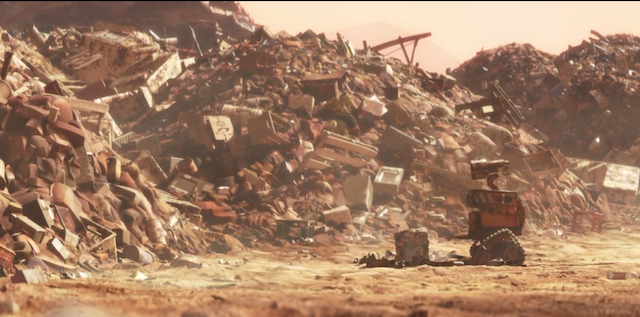
“Environmentalism” has become a loaded word that divides people down political lines. Conservatives hear it and envision dirty tree-huggers who care more about plants than people, while liberals think of greedy corporations that see nothing wrong with polluting the planet.
But the word “environmentalism” really only refers to being concerned about natural resources and the beauty of the Earth — and everyone can agree that we shouldn’t destroy the planet any more than we have to. The issue becomes political only when we define “any more than we have to.” But the basic premise — it’s the only planet we’ve got, so let’s take care of it — is entirely apolitical. It shouldn’t be any more controversial than saying, “Most people like ice cream” or “That’s a lovely sunset.”
I bring this up because there is an “environmental” message in “WALL-E.” To some people, “environmental” automatically means “smug preachy hippie liberal.” It’s a turn-off. They don’t want to see a movie with a “message,” especially not a liberal message from the liberal media that wants to turn their kids into liberals. I hope it doesn’t deter them from seeing this fantastic movie, though, because the actual message in the film, if there is one, is the non-political kind. It’s the “Well, duh” kind. It’s the “Who could possibly argue with this?” kind. The message — are you ready for it? — is this:
It is plausible to think that if we continue to produce the same amount of non-biodegradable, un-recycled packaging, products, and debris that we currently produce, we will eventually fill the planet with so much litter that life on Earth will be unsustainable.
That’s all. The movie does NOT add “… so that means we need the government to regulate production.” It does not add “… so we need to close down all the factories and live like hippies in the mountains.” It also doesn’t add “… so all those conservative jerks are wrong” or “… so vote for Al Gore.”
I’m not convinced the movie set out to send a “message” anyway. New York magazine’s Vulture column (which takes a skeptical view of most things) published this quote from “WALL-E” writer/director Andrew Stanton last week:
“I don’t have a political bent or ecological message to push. I don’t mind that it supports that kind of view — it’s certainly a good-citizen kind of way to be — but everything I wanted to do was based on the film’s love story, the last robot on Earth…. I said, ‘I have to get everybody off the planet, and do it in a way that audiences get it without any dialogue.’ So trash did that. You look at it, you just get it. It’s a dump, you’ve gotta move it — even a little kid understands that.”
The reason I take Stanton at his word is that storytelling has always been the prime directive at Pixar. The plot is never just a framework to throw around jokes (not that there’s anything wrong with that). The story itself is the important part, and the humor, drama, and adventure all extend naturally from it.
So in this case, Stanton had the basic scenario of WALL-E being the last robot on Earth, and he needed to figure out why all the people were gone — not extinct, because we need them later in the film, but not present anymore. Why would mankind leave the planet? I guess it could have been a plague or virus that was killing everyone, forcing the survivors to flee. It could have been some kind of natural catastrophe that had knocked the planet out of its orbit, making the climate too hot or too cold to sustain life. Or, much simpler to convey, it could have been … too much trash.
It’s crucial to understand Stanton’s thought process because it reflects on the movie’s purpose. He apparently did NOT think, “I want to make a movie about the Earth being covered with trash and send an environmental message,” and then brainstorm the robot angle. It was the other way around: WALL-E came first, the reason for the Earthlings’ evacuation came later. And it happened to be a reason that lends itself to a harmless, “good citizen” notion like “give a hoot, don’t pollute.” What’s wrong with that?
If the movie had been strident or angry about it, at the expense of the entertainment value, then that would be a problem. We’ve all seen films where the message was so heavy-handed it ruined the fun, even when it was a message we agreed with. But I can’t imagine anyone watching “WALL-E” and coming out if it thinking the “don’t litter” angle detracted from their enjoyment of the story, which is more focused on love, sci-fi adventure, and comedy. If there is such a person, I suspect it’s the kind who’s rabidly opposed to all “environmental” messages, no matter how innocuous, because they hate, hate, hate liberals. And those people are hopeless anyway.
— Film.com




